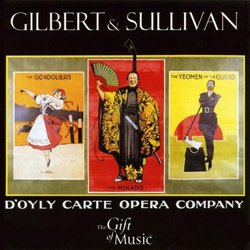| All Artists: D'Oyly Carte Opera Company;New Promenade Orchestra Title: Gilbert & Sullivan Members Wishing: 0 Total Copies: 0 Label: The Gift of Music Release Date: 3/3/2005 Genre: Classical Style: Opera & Classical Vocal Number of Discs: 1 SwapaCD Credits: 1 UPC: 658592110524 |
Search - D'Oyly Carte Opera Company;New Promenade Orchestra :: Gilbert & Sullivan
 | D'Oyly Carte Opera Company;New Promenade Orchestra Gilbert & Sullivan Genre: Classical
Gilbert & Sullivan D'Oyly Carte Opera Company Authentic recordings of the D'Oyly Carte Opera Company performing highlights from three of Glbert & Sullivan's best-loved operettas, filled with humour, pathos, wit - a... more » |
Larger Image |
CD Details
Synopsis
Product Description
Gilbert & Sullivan D'Oyly Carte Opera Company Authentic recordings of the D'Oyly Carte Opera Company performing highlights from three of Glbert & Sullivan's best-loved operettas, filled with humour, pathos, wit - and a whole host of jolly good tunes. The collaboration between W.S.Gilbert and Arthur Sullivan on the famous Savoy Operas began in 1875 with Trial by Jury. They had first met in 1869 at the rehearsal of an operetta, Ages Ago. The composer, Frederic Clay, had asked Sullivan to give him some practical criticism and he took the opportunity to introduce him to his librettist, Gilbert. It was not long before an enterprising impresario, John Hollingshead, who founded the Gaiety Theatre and was busy setting it on its feet, commissioned the pair to compose a comic opera for his theatre. Thespis was the first of the G & S comic operas. It soon became apparent that they were bringing comic opera into new areas. Trial by Jury followed, the first of their operas to be composed for Richard D'Oyly Carte, the impresario who was responsible for their greatest achievements. D'Oyly Carte declared that Sullivan was the only man in England to stand alongside Offenbach. Trial by Jury opened at the Royalty Theatre on 25 March 1875, was highly acclaimed by the critics, and ran for 128 performances. The event was hailed as the re-awakening of English comic opera. In 1876, Richard D'Oyly Carte formed his own comic-opera company, and on November 17 1877, he launched his new venture with The Sorcerer, written by Gilbert and Sullivan. It was followed, six months later, by HMS Pinafore, which ran for two years. In America, two years later, they introduced The Pirates of Penzance to wildly enthusiastic New York audiences. In 1881, Patience, which had opened at the tiny Opera-Comique theatre, near the Strand, was transferred to D'Oyly Carte's new theatre on the Strand itself, the Savoy. This would be the venue for each subsequent G & S operetta until 1891, when a rift between Gilbert and D'Oyly Carte brought the association to an abrupt end. Each comic opera that followed was more successful than its predecessor. Iolanthe arrived in 1882, Princess Ida in 1884, and the following year, came The Mikado or The Town of Titipu. Gilbert's inspiration came from a Japanese sword that hung on the wall of his home in Kensington. The setting is Japan but the butts of its satire are, of course, all very English. The plot revolves around Ko-Ko, one time tailor and now Lord High Executioner, who is betrothed to Yum-Yum. She, in turn, is in love with Nanki-Poo, who is really the Mikado's son, now disguised as a wandering minstrel to escape the advances of his aging fiancé. Needless to say, it all ends happily. The Mikado opened on 14 March 1885 and ran for 672 performances. The Yoemen of the Guard or The Merryman and His Maid remains one of the best-loved and much the most serious of the Savoy Operas and for it Sullivan provided what is, arguably, the finest operatic overture by any British composer. We are in the Tower of London in the 16th century with Colonel Fairfax condemned to die. He informs Sir Richard, the Lieutenant of the Tower, that he wishes to marry before his death in order to thwart the machinations of a relative. His escape is engineered with Fairfax learning that he had been reprieved but that the warrant had been deliberately held up by his relative. Fairfax, who had been in disguise, reveals himself and claims his wife-to-be. The operetta was an instant success and enjoyed an initial run of 423 performances.

 Track Listings (23) - Disc #1
Track Listings (23) - Disc #1
